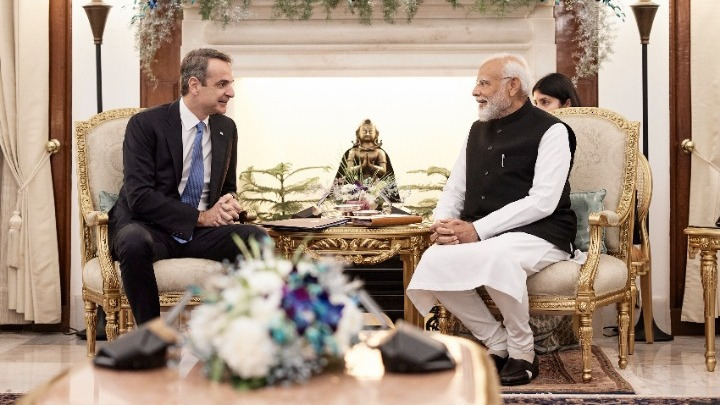“Greece and India are close to one another in many respects. Our shared values serve as a bridge that brings us closer,” Prime Minister Kyriakos Mitsotakis said on Wednesday during an official visit to India, the first by a Greek premier in 16 years, in joint statements with his Indian counterpart Narendra Modi after their meeting in New Delhi.
Among these shared values, Mitsotakis cited “a certain shared ‘ethos’ or ‘dharam’, as you call it,” as well as a strong commitment to international law, especially the United Nations Convention on the Law of the Sea, as well as their loyalty to the principle of the UN charter, diplomacy and stability.
“In every area our cooperation shows great promise, not only bilaterally but also in multilateral areas, including the UN,” he said. Among the main goals of his visit, Mitsotakis said, was an increase in mutual investments, as well as the doubling of bilateral trade, possibly even before 2030.
He noted the significant prospects for cooperation between Greece and India through the India-Middle East-Europe Corridor (IMEC): “Greece – you just have to look at a map to realise this – is India’s gateway to Europe and through IMEC we see our participation as a very important aspect of this strategic partnership… but in order to achieve this we need peace in the Middle East, and stability is the necessary condition for every project that aims to increase the prosperity of the greater region for the benefit of all countries involved.”
The Greek prime minister also stressed that international partnerships and collective action were paramount for governments to tackle the great global challenges at this time. “India has a critical role to play in this endeavour and we view India as one of the main pillars of stability and security in the broader region of the Indo-Pacific…we consider our country to constitute a pillar of stability in our own region, the Eastern Mediterranean, and it is this mutual commitment to peace that has brought us so close,” Mitsotakis said.
He noted that the joint declaration signed by Greece and India in Athens in August had upgraded the two countries relations to a strategic level and was already being put into practice, agreeing with Modi that significant progress has been made in deepening strategic cooperation in all spheres, including investments, security and defence, trade and technology, cyberspace, education, culture, tourism and agriculture.
“Crucially, the world’s oldest democracy and the world’s largest democracy share the mutual political will to cooperate with each other to establish partnerships and to explore and create new synergies,” Mitsotakis remarked.
“In Prime Minister Modi I have found a visionary, a principled leader and a true friend,” Mitsotakis said, noting that their meeting had placed emphasis on strengthening bilateral economic relations in renewable energy infrastructure, ports and shipping and logistics and information technology, among others.
Referring to the agreements already signed in defence and agriculture, Mitsotakis also highlighted the importance of a memorandum of cooperation to be signed by the two countries on migration and mobility.
“It will constitute a very important step towards strengthening our cooperation on issues such as legal migration, fighting human trafficking but also offering young Indians an opportunity to come and work in Greece and benefit from the growth of our economy,” he said.
Modi: There are opportunies for closer cooperation
The Indian prime minister, on his part, described Mitsotakis’ visit to India as an incredible opportunity, saying the two countries aimed to further promote their relations. He said that there were opportunities for closer cooperation and that the two countries were taking the necessary steps for this, citing defence, mobility and migration as areas for where there are new opportunities for cooperation.
Meeting at Hyderabad House seeks to upgrade bilateral relations on all levels
The meeting of the Greek and Indian delegations at Hyderabad House focused on strengthening and upgrading bilateral relations on all levels, as outlined in the Joint Statement of Strategic Partnership signed in Athens in August.
In addition to the goal of doubling bilateral trade, they discussed more systematic contacts and connections with Greek and Indian businesses, particularly in advanced technology, digitalisation, start-ups, infrastructure and logistics, with Mitsotakis highlighting the great opportunities for Indian businesses due to Greece’s strategic location. The two prime ministers also exchanged view on cooperation in defence, education, culture and especially the protection of monuments.
The two sides also discussed the prospects of collaboration in renewables and agriculture, while the two leaders expressed their intention to soon sign a bilateral agreement on mobility that Mitsotakis said will enhance cooperation on legal migration and allow Indians to come to Greece in order to work.
In addition, they discussed issues of international and regional interest, with emphasis on the situation in Gaza and the latest developments in the Middle East.
Following the meeting with his Indian counterpart, Mitsotakis had a meeting with Indian Vice President Jagdeep Dhankar. They discussed the deepening of bilateral relations and the common challenges facing both countries, as well as Greece’s role as a pillar of stability and security in the broader region.
SOURCE; ANA-MPA








